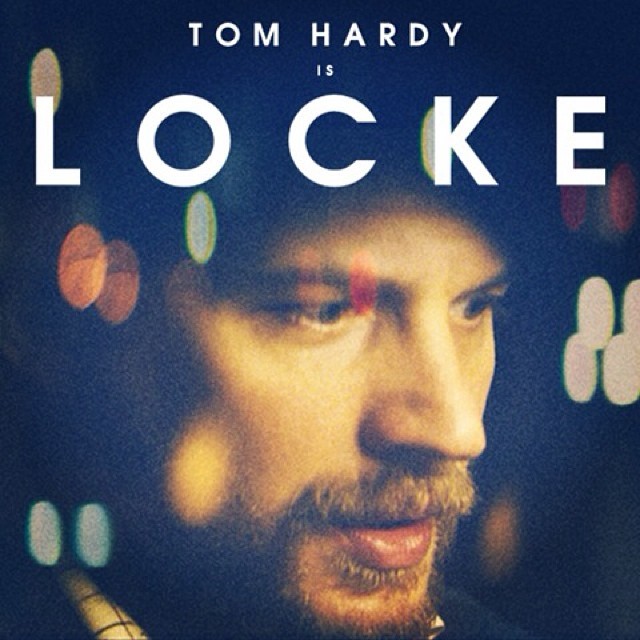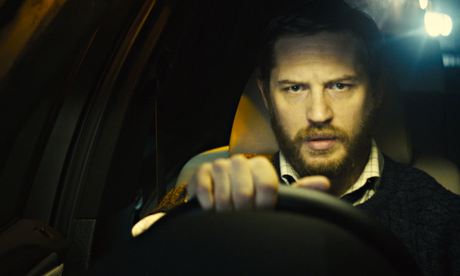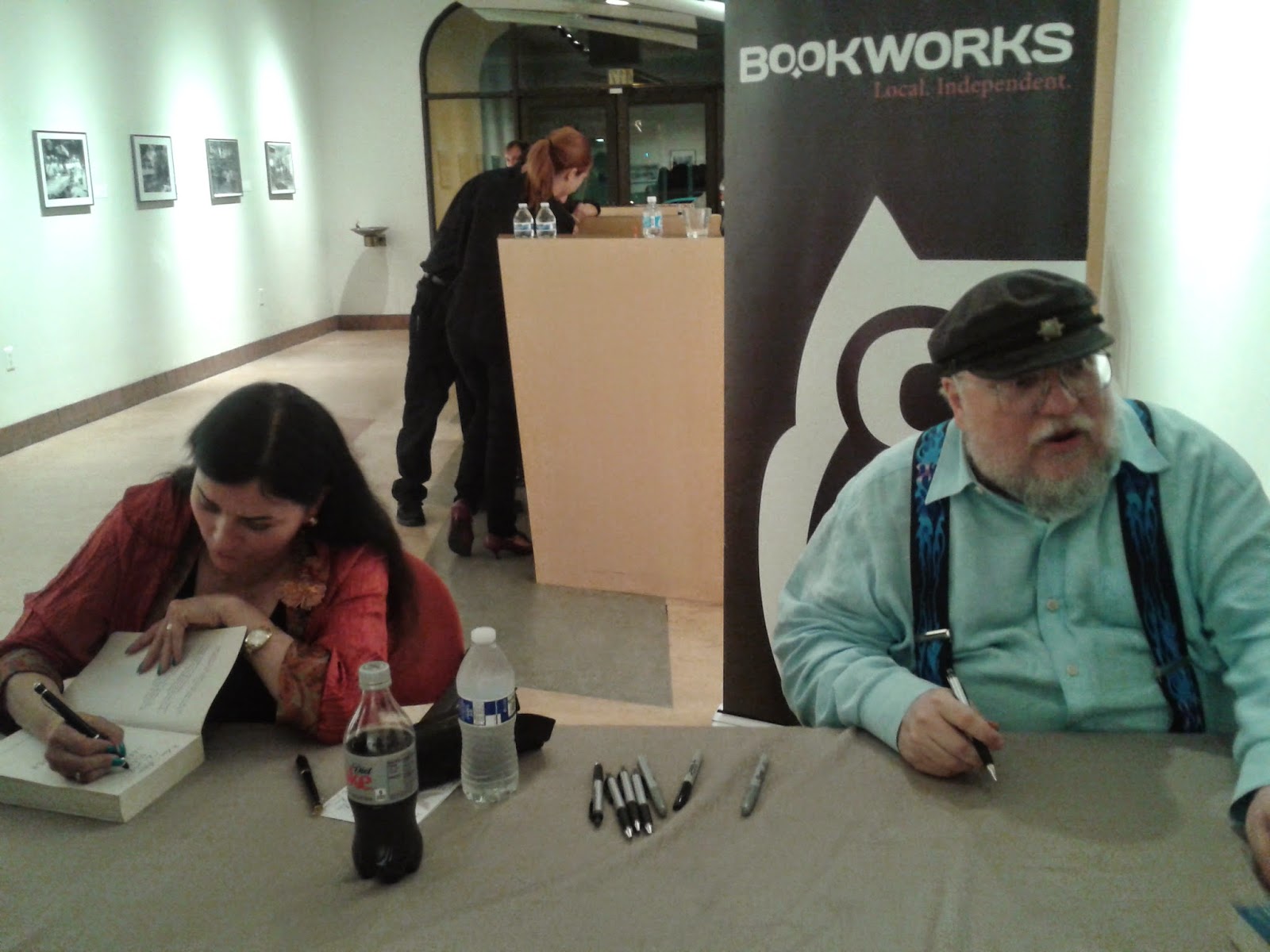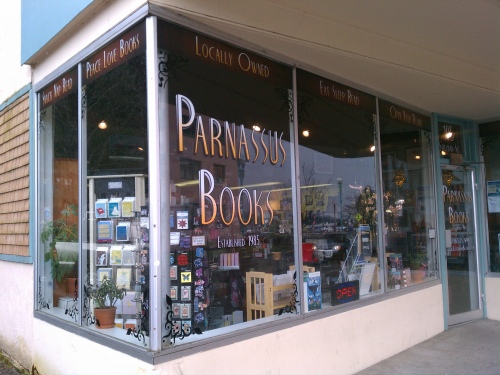I went to see the movie
Locke this week, after hearing nothing but praise about the film from every critic I trust. It was not showing in the megaplex, but in a theater that tends toward Sundance and Cannes winners, so that gives you a notion of what the film is like. The other thing you need to know before going (which I did know, and which I warned my two companions to expect) is that the entire movie is set inside a BMW. Tom Hardy is the only human being we see, and he does nothing more than talk on the phone (and to himself) for the 85-minute duration. It's set in real time, so his 85 minutes are your 85 minutes.

When I told my son about the premise, he said, "That sounds awful." And I have to agree ... it does sound awful. And yet—it works. It certainly is a refreshing change-up from the CGI-filled, city-destroying, fire-breathing, smash-everything, superhero explody megamovies one usually finds in the theaters this time of year. (Or any time of year.) There's not much less cinematic than a dude talking into space for an hour and a half.
So how does this film work? Well, first, think of the screenplay as akin to
Waiting for Godot (cited in the film, surely not by accident), in which the setting is static and dialogue is everything. Very good dialogue can carry a story forward, and the writing does about half the heavy lifting in this film. (So, writers: take note.) Tom Hardy's face does the rest of the lifting. For those who are familiar with his work, you already know what a phenomenal actor Hardy is. He is a chameleon, not a type actor. He can be the impassioned Heathcliff from
Wuthering Heights, the cold, evil Bane from
The Dark Knight Rises, or the silky, charismatic Eames from
Inception. If there is one thing that holds true from character to character for him, it's a sense that he's simmering. Hardy always a bit coiled, a bit ready to explode. He brings that panther-like impression to his Locke character in this movie, which is one way the audience's attention is held rapt.
When will this Locke fellow lose his shit? You know it's got to happen at some point.
You know it's going to happen because during the 85-minute car ride, Ivan Locke's life falls apart. We begin with him at his workplace, somewhere outside of London, where he is a foreman in a construction company that is just about to undertake “the biggest concrete pour in the history of Europe, barring nuclear and military.” So this is the eve of the biggest job of his career, and in the next few hours quite a bit hinges on the decisions he makes—and that's just at work. He's been a company man, a solid man, reliable and steady, for nine years. But as everyone is about to discover, he has not been entirely responsible. Almost, but not entirely.
Almost a perfect employee.
Almost a perfect husband and father.
As his wife is soon to remind him,
almost counts for nada. One of the first calls he takes is from Bethan, a woman who is not his wife and who, we learn, is about to give birth to his child. Bethan is "quite old, she's forty-three," and "not an oil painting." The child was begat seven months ago, on a night that included two bottles of wine, forced time away from the wife, quite a bit of stress and loneliness, and a dose of pity for poor "old" Bethan. [On behalf of all 43-year-olds out there, meanwhile, I protest.] Bethan's labor has begun two months before term, so Locke has made a sudden decision to meet her at the hospital, rather than go home to a wife and two sons who have been waiting for him, anxious to watch the big football match.
Ivan Locke is a man determined to make things right. He knows he made a horrible mistake and he's determined not to muck things up more than they already are. He is a man, above all, trying to
be a man. A real man, the kind who faces up to his responsibilities. What's driving him, we soon find out, is the spectacular failure of his own father. One of Locke's most impassioned conversations in the car is the one he has with his invisible, long-gone father. I would not qualify this bit of the film as one of its successes: all three of us were convinced for a bit that Locke was raving at a body in the trunk or something. The camera picks a few stand-ins for the father, including a patch of light in the rear window, a pair of headlights, and a backseat. It's confusing and a little odd.
While he's dealing with his daddy issues, meanwhile, things are going to hell with the construction project. (Of course they are: you don't have a story unless things are going to hell, and you especially don't have a man-driving-a-car story in which disaster isn't imminent.) Locke was supposed to guide the project to completion that very night, but because of the Bethan emergency he's ceding control to his deputy, the hapless Donal. While things go sideways with scared, drunken Donal, Locke also has to let his boss (whom Locke has labeled "Bastard" on speed dial ... layers of meaning there, of course) know that he's taking off for London, and why. "Bastard" is not happy. Locke gets yelled at. A lot. By everyone.
Hardy chooses to play Locke with a beautiful, melodious Welsh accent, which helps illustrate the careful control the character is trying to maintain. As tears well up and eventually spill down Locke's cheeks, his voice remains firm, reassuring, reasonable. Meanwhile, because it
is Hardy on the screen, we can see the control beginning to slip.
When will he explode?

In spite of what I said about Godot, this film is not entirely static. It wouldn't make a good play. The cinematography, in fact, is key to maintaining tension. There are lights all around Locke. His face is bathed in light. Headlamps in his rearview mirror, traffic lights, oncoming headlights, brake lights ... and a lot of emergency vehicles. The audience may not even consciously notice all the ambulances sharing the road with Locke's Beemer, but these flashing lights and sirens plant the expectation of disaster. Locke is also as distracted a driver as you could get: he chugs down cough medicine, stares at his phone, reads pages of information to Donal, and argues with his invisible father in the backseat. His eyes are off the road quite a lot, and when they are on the road, we notice oncoming lights going in and out of focus, as if that's how Locke is seeing it. He looks exhausted, he's tearful, he's half-asleep. And then we get the call that the birth may not be going well, so in addition to wondering how that story is going to turn out, we're left wondering whether Locke will even survive long enough to get to the hospital. Tension, tension. It's how you keep an audience at the edge of their seat while never leaving one small claustrophobic setting.
In the end, I felt
Locke was a redemption story, the story of an Everyman who has made his mistakes and is dealing with them head on. Locke is not a superhero, he's a regular hero. An ordinary working stiff and family man who's doing his level best not to screw it all up too badly. Students of philosophy won't miss the reference to John Locke, and indeed director Steven Knight says the title character's name is not a coincidence. "Although these events won’t make the paper or the local news, for the people involved it’s the end of the world and that does deserve a film, it’s worthy of drama," Knight says in
this interview. "Just deciding that in an ordinary man’s life there are events that are tragedy, in the classic sense. He’s called Locke because he’s the John Locke philosopher of rationality, and he’s trying to do stuff logically." Not only that, but John Locke believed humans were blank slates, whose selves were determined by deliberate action and choice. The choices Ivan Locke makes in these 85 minutes determine what kind of man he is and will be; by his own definition, by his own will.
A few interesting facts I learned about the movie as I researched it for this piece:
• Hardy didn't learn the lines; he read them from a script that was projected in front of him, and in some scenes he reacted organically to live phone calls from the other actors.
• The whole film was shot in eight days.
• The movie was filmed in real time, as if it were indeed a play. They did not stop for reshoots. From the NY Times: "In effect, they shot the entire film twice a night, breaking only to change the cameras’ memory cards, every 27 minutes."
• Most of the time Hardy sat in a car that was itself sitting on a flatbed attached to the back of a truck. The truck was driven down a highway as the crew filmed.
Have you seen Locke? What did you think? If you haven't seen it, does the premise intrigue or repel you?
 |
| From www.rottentomatoes.com |



















